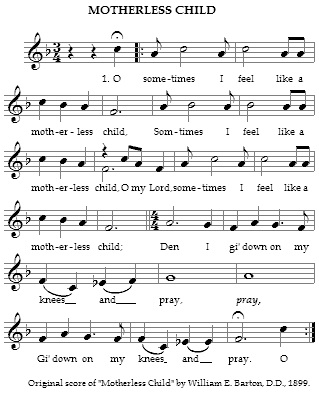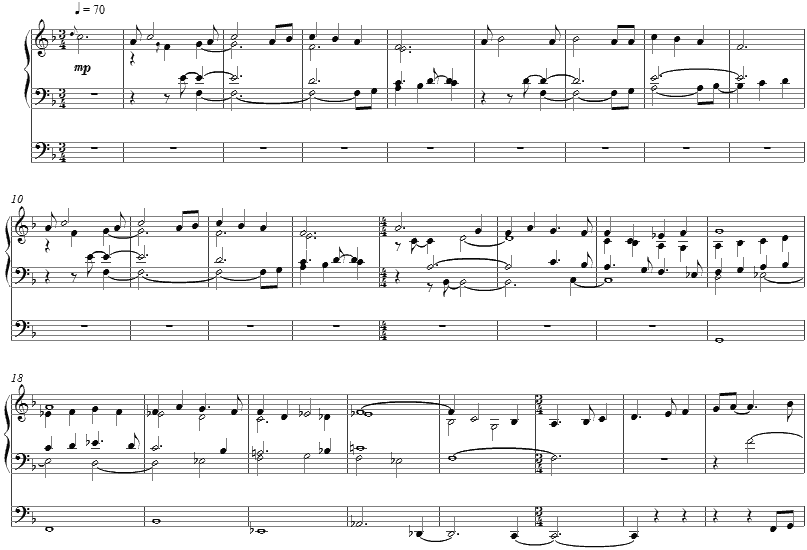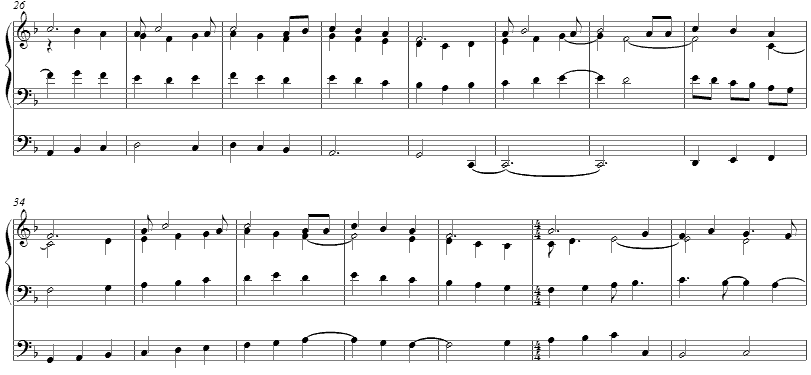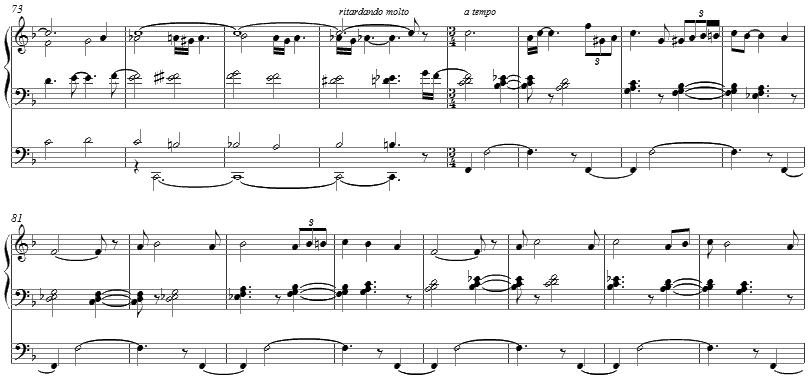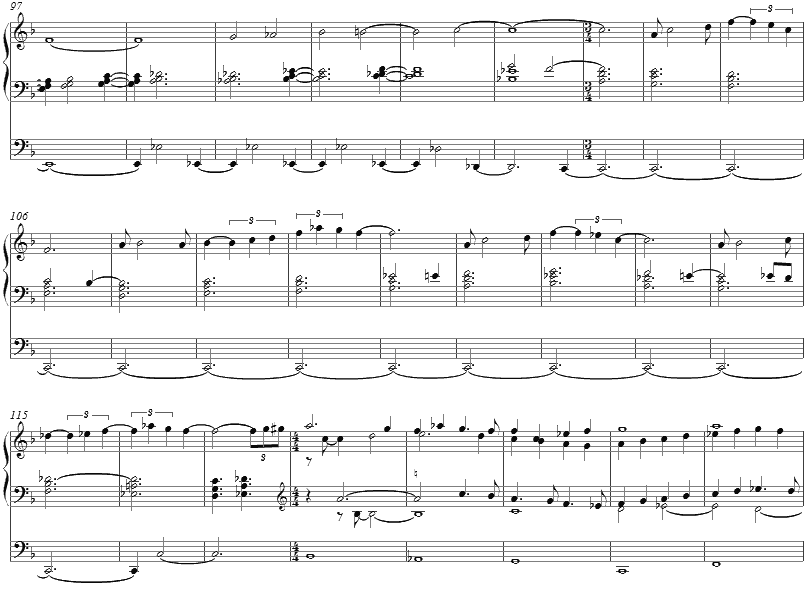Music and Texts of GARY BACHLUND
Vocal Music | Piano | Organ | Chamber Music | Orchestral | Articles and Commentary | Poems and Stories | Miscellany | FAQs
Meditation on "Motherless Child" - (2008)
for organ
"Sometimes I Feel Like a Motherless Child" (or simply "Motherless Child") is a traditional Negro spiritual; yet another emerging political correctness uses the term, "African-American spiritual," as if the word Negro were inappropriate. It is not, for generations of poets and musicians have used the term unabashedly and correctly. This song dates back to the era of slavery in the United States when it was common practice to sell children of slaves away from their parents. As with many traditional spirituals and other songs, it has many variations.
At an organ concert given my David Hurd in Pasadena in June of 2008 -- see my Variations on a Theme of Hurd -- he played his fine variations on this theme. I thought it apt to add to the variants based on the tune, for organ as did he.
From its beginnings, the song is an expression of separation and despair, conveying the image of a child who has lost its mother, though the repetitive singing of the word "sometimes" in the song's melody line suggests that sometimes one does not feel like that motherless child; a metaphor in use among slaves in the time before the Emancipation was “a long ways from home”—home being both house and family, and heaven.
The well-known lyrics which capture a little of the dialect [ 1 ] of the era and black culture and were set down by Barton in 1899 are as follows:
1-- O, sometimes I feel like a motherless child!
Sometimes I feel like a motherless child! O my Lord!
Sometimes I feel like a motherless child!
Den I git down on my knees and pray, pray!
Git down on my knees and pray!
O, I wonder where my mother's done gone,
Wonder where my mother's done gone.
I wonder where my mother's done gone.
Den I git down on my knees and pray, pray!
Git down on my knees and pray!
2-- O, sometimes I feel like I'd never been borned!
Sometimes I feel like I'd never been borned, O my Lord!
Sometimes I feel like I'd never been borned,
Den I git down on my knees and pray, pray!
Git down on my knees and pray!
O, I wonder where my baby's done gone,
Wonder where my baby's done gone.
I wonder where my baby's done gone.
Den I git down on my knees and pray, pray!
Git down on my knees and pray!
3-- O, sometimes I feel like I'm a long ways from home, etc.
I wonder where my sister's done gone, etc.
4-- Sometimes I feel like a home-e-less child, etc.
I wonder where de preacher's done gone, etc.
These variations based on the 1899 version of the melody [ 2 ] in the style of a meditation begin with a lightly modernized harmonization of the theme in its entirety. The score in under marked in terms of dynamics, ritardandi and rubati, as the performer is encouraged to find in the score his own expression, registral colors and phrasings.
The next two variations emphasize a diatonic, four-voiced chorale in which no "blue note" variants are added. Stepwise voice leading predominates.
An elongation of the cadential material closes the harmonies in to denser chromatic colors to introduce another variation in which the accompanying voices are lightly syncopated parallel seconds and thirds, adding the mild flat seventh of the scale.
The final statements of the theme are variant melodic forms and the underlying accompaniment begins with parallel second-inversion triads, as the third and seventh of the scale are sometimes flatted extending the implications of a more ranging tonality.
[ 6 pages, circa 7' 30" ]
The entire work is here,
, an MP3 file [ 6.85 MB ]
The score for Meditation on "Motherless Child" is available as a free PDF download, though any major commercial performance or recording of the work is prohibited without prior arrangement with the composer. Click on the graphic below for this organ score.
Meditation on "Motherless Child"
NOTES
[ 1 ] The whole notion of written-out black dialect, in all its forms, is contentious to some but not all. From the various authors and poets who have written in dialect, one can point to the famous libretto of Porgy and Bess (Ira Gershwin), but at the same time and perhaps more importantly to black poets such James Edwin Campbell (Echoes from the Cabin) and Daniel Webster Davis (Hog Meat), whose marvelous black poetry is written in the prevailing dialect of an era. It is not up to us from a modern perspective to second guess their artistic intent, but rather simply to honor it.
[ 2 ] "Motherless Child", was most likely first published in William E. Barton’s Old Plantation Hymns, Boston, 1899. Barton writes of two women -- his informants, in the anthropological sense -- in the chapter titled "Hymns of the Slave and the Freeman," that:
"...they both protested that they had sung me every song they knew, -- an they invariably found one or two more. One of these songs was "Motherless Child," or "I feel like I'd never been borned." It is one of the most pathetic songs I ever heard.
"Not very long ago I attended a concert given be a troupe of jubilee singers, whose leader was a member of the original Fisk company. Toward the end of the programme he announced that a recently arrived singer in his troupe from Mississippi had brought a song that her grandparents sang in slave times, which she counted the saddest and most beautiful of the songs of slavery. It was a mutilated version of Aunt Dinah's song; it lacked the climax of the hymn as I have it, -- the "Gi' down on my knees and pray, PRAY!" The swell on these words is indescribable. Its effect is almost physical. From the utter dejection of the first part it rises with a sustained, clear faith. It expresses more than the sorrows of slavery; it has also the deep religious nature of the slave, and the consolations afforded him in faith and prayer.
"Sister Bemaugh did not know this song. Aunt Dinah explained it to her, as she learned it with me, and I wrote down many scraps of their conversation while they thought I was only writing down the hymn; and sometimes they talked for quite a while undisturbed by my presence, as I sat at the ironing-table beating out the tunes which they had sung. Said Aunt Dinah, -- I copy from the margins of my score:
"You des' gotter staht dat song in a mourn. Dey hain't no uddah way to git de hang ub it. Fus' time I hear it, I wis' de Lawd I cud lun it. I tried, an' couldn't. I went home studyin' it, an' all to once it come a-ringin' through me. Den I sung it all night."
